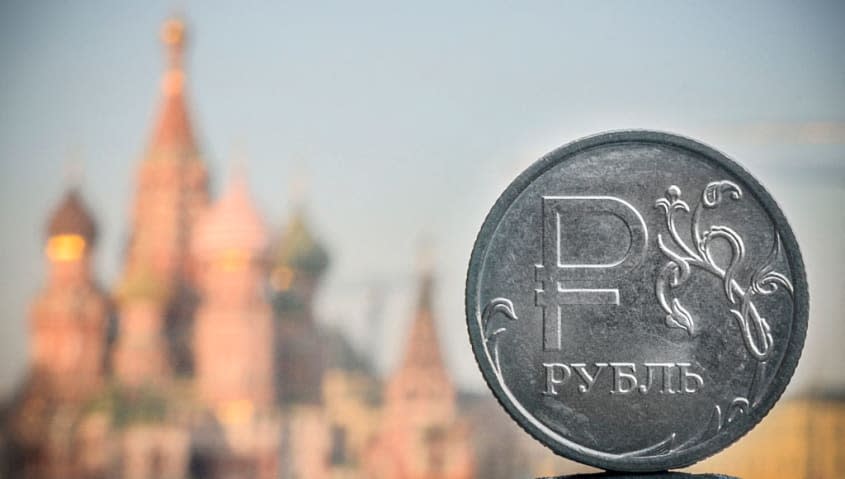How the collapse of the ruble could impact the war in Ukraine

- Oops!Something went wrong.Please try again later.
The Russian ruble has been declining steadily and reached a 17-month low this week, tumbling past 100 rubles to the U.S. dollar. This gives the ruble less value than a single American cent and represents a loss of nearly 40% of its value since the beginning of the year. The ruble immediately plunged following Russia's invasion of Ukraine in February 2022. It saw an uptick at the end of that year but has been falling ever since.
This can mostly be attributed to Western countries continuing to shun Russian production throughout 2023. Russia is "selling less abroad — mainly reflected in falling revenue from oil and natural gas — and it's importing more," The Associated Press reported. This has resulted in companies and business owners "selling rubles for foreign currency like dollars or euros. That lowers the ruble's exchange rate."
Russia's central bank has been hiking interest rates in a futile attempt to salvage the ruble, and bank officials said they do "not see any risks to the country's financial stability," an opinion mirrored by Russian President Vladimir Putin. However, while Russia's economy is undoubtedly damaged, the biggest question may be what happens in Ukraine. Will the collapse of the ruble be the final blow to Russia's war of aggression? Or will the Russian economy be able to hold out and continue funding the invasion?
It will hurt Russia's war effort
Despite the central bank's insistence, the interest rate hikes are "unlikely to quickly stem the currency's decline, with consequences for Vladimir Putin's ability to wage war," The Economist stated. The collapse of the ruble has been compounded by "sanctions and capital controls [that] have left Russia isolated from the international financial system."
What is likely to happen, The Economist opined, is that Russia's "civilian economy will take the pain," even if the government were to "cut back on spending, including on its armed forces, to reduce imports." Higher interest rates will "weaken the purchasing power of ordinary Russians … thus the fate of Russia's economy will not be decided by the judgments of international financiers but by the depths of Putin's aggression."
Russia likely won't be able to keep the war going indefinitely, because the ruble's decline is in a "permanent trend of depreciation," Oleg Itskhoki, a professor of economics at UCLA, told The Washington Post. Itskhoki added that there was "not much" the central bank could do to stem the ruble's fall, beyond introducing restrictions that would further isolate Russia's economy. "Now is also a good time for the West to crank up financial and export sanctions to limit the fiscal space for current and future Russian war efforts in Ukraine and elsewhere," he said.
But it won't stop Putin
While the economic situation in Russia is dire, the country's economy has "held up better than expected thanks to a gusher of oil revenue and heavy government spending on war-related production," Chelsey Dulaney and Georgi Kantchev reported for The Wall Street Journal. This is not an unprecedented situation, the pair said, as "war and a weak ruble have often gone hand in hand" in Russia.
Tatiana Orlova, a lead emerging market economist at Oxford Economics, told the Journal that the ruble's collapse may not all be due to the war but simply because "August is often a bad month for the ruble as Russians swap their rubles for foreign currency to fund holidays abroad."
More symbolic than anything
While the ruble's decline may not have a direct impact on the war, the currency's exchange rate has "powerful symbolic importance as a marker of the economy's overall health," Jake Cordell wrote for The Moscow Times. Given that the war has gone on for 18 months, the ruble's decline "underscores the challenges Moscow will face in an attempt to repeat last year's fire-fighting efforts."
Russia's adversaries are also taking note, as the ruble became a symbol of autocracy and autarky to the West, while its exchange rate prophesied Russia's fate in its latest war," Carey Mott wrote for Foreign Policy.
Money can "play a role in creating and shaping democracy," Mott added, and "powerful rulers can use the very same instruments to control the public and consolidate their autocracy." So while the ruble may be damaged, some feel that Russia's war effort will continue as long as Putin remains in power.

